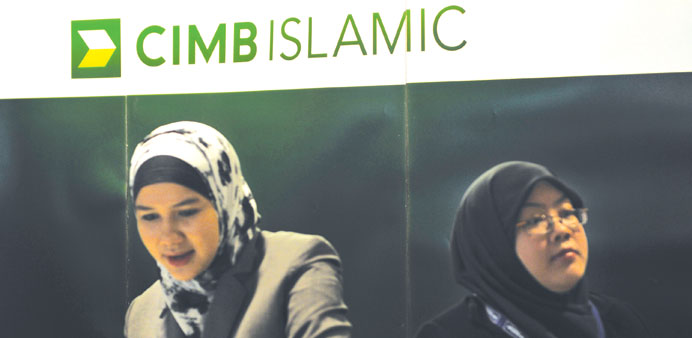Bloomberg
Sukuk sales by Malaysian lenders seeking to comply with Basel III rules are drawing strong demand, prompting arrangers to predict a rush of offers.
CIMB Islamic Bank Bhd., a unit of Malaysia’s second-biggest lender, has submitted a proposal to the Securities Commission for a 5bn ringgit ($1.6bn) programme, a person with knowledge of the deal who asked not to be identified because the information hasn’t been released, said. Public Islamic Bank Bhd. received approval for a similar-sized programme, an April 23 stock exchange filing shows.
AmIslamic Bank Bhd., Maybank Islamic Bank Bhd. and RHB Islamic Bank Bhd. have sold a combined 2.2bn ringgit of Basel III sukuk since late February. The RHB sale on May 2 drew bids for 7.5 times the 500mn ringgit on offer, showing a more than doubling of Malaysian corporate sukuk sales this year isn’t damping demand. The country’s Shariah-compliant banking assets climbed 12% last year and they now account for a quarter of the total, central bank data show.
“Demand for Basel III sukuk will be healthy as there’s still ample liquidity in the system,” Mohd. Effendi Abdullah, head of Islamic markets at Kuala Lumpur-based AmInvestment Bank Bhd., Malaysia’s third-biggest Islamic debt arranger last year, said in a May 12 interview. “Banks that haven’t issued such bonds will also have to follow suit.”
Lenders that are yet to sell Basel III securities that comply with the religion’s ban on interest include Hong Leong Islamic Bank Bhd., Affin Islamic Bank Bhd., Bank Islam Malaysia Bhd. and Alliance Islamic Bank Bhd.
The Basel Committee issued rules in 2010 to boost banks’ capital-adequacy ratios and give them an extra buffer against losses following the global financial crisis that started in 2008. Bonds that comply with the regulations are typically higher-yielding as they can be written down if local regulators deem the issuing lender non-viable.
Worldwide sukuk sales have increased 13% to $17.9bn so far in 2014, data compiled by Bloomberg show. Malaysian companies have sold 26.1bn ringgit of Shariah- compliant debt this year, compared with 11.8bn ringgit at the same point in 2013. That makes up 51% of all corporate bond offers in the country, from 39% for the whole of 2010, central bank figures show.
“Demand for sukuk from stronger banks will always be there as we are seeing investors shifting to sukuk,” Hoe Cheah How, chief investment officer overseeing 38bn ringgit at Kuala Lumpur-based RHB Asset Management Sdn., said in an interview on Wednesday. “The government’s drive to promote Islamic finance will help boost Shariah-compliant debt offerings.”
Malaysian banking assets that comply with the religion’s ban on interest climbed to a record 556.5bn ringgit in 2013, according to the central bank’s annual report.
AmIslamic Bank issued the country’s first Basel III sukuk on February 26, selling 10-year bonds at a yield of 5.07%. AmBank (M) Bhd., owned by the same parent company as AmIslamic, sold Basel notes of the same tenor at 5.2% in December. Maybank Islamic Bank issued 1.5bn ringgit of the 10-year securities at 4.75% on March 28. That compared with the 4.9% its non-Islamic parent paid when it issued similar- maturity paper in January.
Sukuk sales in Malaysia are supported by demand from sovereign funds, Islamic insurers and pension funds, which have a strong preference for the debt, said Wasim Saifi, the chief executive officer of Standard Chartered Saadiq in Kuala Lumpur.
“This additional pool of Islamic liquidity has historically helped to tighten the profit rates of sukuk for issuers,” he said in an e-mail interview on Wednesday. “The conventional investor base in Malaysia is also comfortable with investing in sukuk.”

